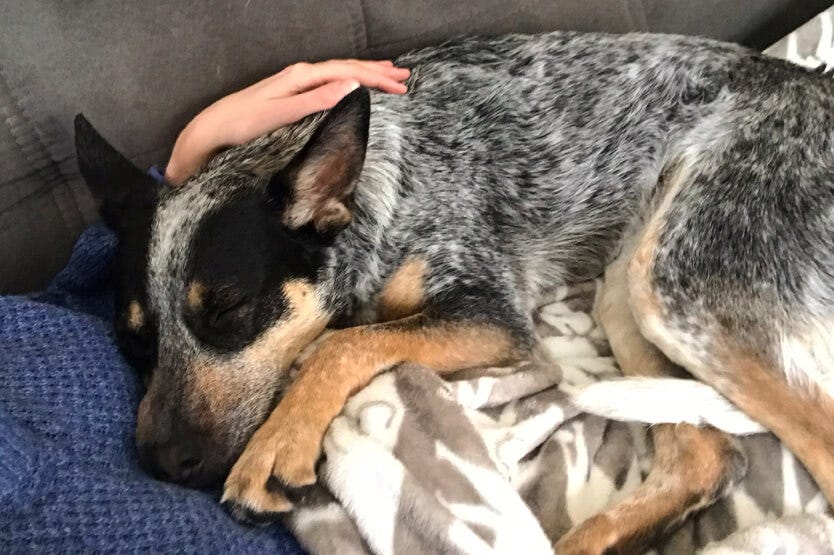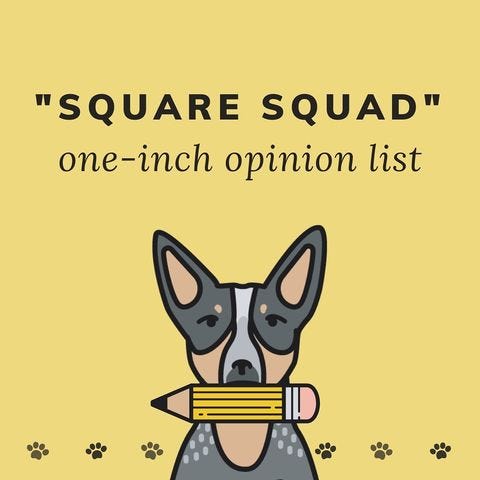Why does your dog need to do… well, anything?
First written in May 2020 and last updated in January 2022.
When I first adopted Scout, I remember feeling pressure to teach her certain things. It came from friends, social media, and this little voice in my head ceaselessly lecturing me on what a “good” dog does.
Good dogs sit. Good dogs heel. Good dogs love everyone. Good dogs this, good dogs that, good dogs the other thing.
Some of it made sense. There are “standards” dogs are encouraged to learn for good reason if we’re going to take them out in public, demonstrated by tests like the Canine Good Citizen that focus on being polite around other people and dogs.
But as I’ve become more invested in training Scout, I’m no longer satisfied with an arbitrary list of things that external sources say she “should” know.
No—now, I make it my first priority to ask myself why I teach her anything.
What actually makes a difference in your day-to-day life?
We all have different ideas of what a “well behaved” dog looks like. None of our situations are the same—and it makes sense that we don’t have identical expectations for our dogs, either.
Lately I’ve been trying to focus on what really matters for me to live a good life with Scout.
When I think about her training, there are things she needs to be able to do because they make our day-to-day routines easier—like not reacting to dogs on bathroom breaks, staying calm while I’m working from home, letting me trim her nails, and so on.
There are also things I just plain want to do together, and that’s cool too. One of the joys of owning a dog is that we can always move forward and make more progress!
But I want to spend the bulk of my time on the stuff that will make the biggest impact on our lives—not the stuff that I feel like “should” matter.
I’m getting rid of the “supposed to”s.
What does your dog need to live their best life with you?
Not what Google says they need, or what your neighbor says they need, or even necessarily what a trainer says you need. What does your dog need to live their best life with you?
Why does your dog need to know “down”? To use it as an incompatible behavior for management around reactivity triggers? To earn his or her Canine Good Citizen? Because “good” dogs know how to lie down on command?
Why does your dog need to know “heel”? To politely pass people on walks? For competition?
Why does your dog need to know “stay”? Why does your dog need to know “place”? Why does your dog need to know anything?
Every dog is different, every owner is different, and every lifestyle is different. The way I live with Scout might not work for some other dog-owner teams—and that’s okay! Just because we don’t do everything the same doesn’t mean we either of us is wrong.
In my personal life with Scout, we want to live well together
This is the ultimate reason I got a dog—to have fun, to be a team, to enrich each others’ lives! There will always be hard moments. But when the joy far outweighs the struggle overall and we enjoy each other on the average, we’re living well.
To work towards that overarching goal, we prioritize:
Day-to-day harmony
A good life together starts at home. If we live with minimal conflict in our familiar space, we can tackle more challenging situations! Also, we logistically spend most of our time on our own property—so I want to prioritize the quality of that time.
Our dog’s ability to be left alone without separation anxiety
It’s important to me to have the freedom and flexibility to do things without my dog, too—and to fully enjoy those activities knowing she is safe and comfortable at home.
Comfort in nature
At minimum, I’d like to be able to spend time with my dog in nature (without either of us being scared or on edge). Fresh air and exercise are important for both of us, and even if she was never able to handle busy public environments, we could still get fulfillment in parks, on hikes, and so on.
Confidence in public
In my perfect world, my dog gets to join me for many activities. With van life in our plans, we’ll be traveling through different cities regularly—and it would be great for her to be comfortable, confident, and polite enough to explore those new places with us!
Behavior at restaurant patios
This is a specific part of our “confidence in public” goal.
Sean and I love trying new food together. Being able to bring Scout along without worry means we can stop at patios on the way home from hikes, beach trips, and so on. It’s convenient and means she can spend more time with us, making all our lives better!
Specific obedience that makes those larger goals possible
Obedience is useful management in a range of situations. It helps me achieve the other larger goals that are important to us (like being able to navigate busy public environments), but it is rarely my end goal in and of itself.
Some of the commands we use most often are:
Down with implied stay (useful in so many scenarios)
We ask what makes life less stressful and more seamless
That’s really the meat of it. We do all sorts of things that build into those larger goals, too. Door manners, crate training, additional impulse control…
But when it comes down to it, in order to live the life I want with Scout—and to fulfill her needs as much as I understand them—the big things we work towards are:
Having harmony with us in day-to-day household interactions
Enjoying nature confidently and safely
Being polite and comfortable in a range of public environments
Other people have other goals. What matters to me might not matter to you. What matters to you might not matter to me. That’s a wonderful thing. It gives us the freedom to choose our own “why”s and stand strong in the lifestyles we love!
The below visual sums up how I’ve come to think about our life together.
If Sean and I hated eating out (so we never went to patios) or lived in an area without much nature to explore (so Scout being comfortable on isolated trails wouldn’t matter) or were really into dog sports or so on, those goals and their order might be different.
Our outcomes and “why”s don’t need to look the same
Just because your neighbor really cares about his dog playing fetch doesn’t mean you and your dog have to love that traditional game.
Just because I care about Scout keeping a loose-leash on a collar doesn’t mean you have to ever walk your dog on anything but a harness. Maybe you’re always okay with a bit of pulling, and you live in an environment where leash manners aren’t a priority, and that works for the relationship you want to have.
If everyone is happy and no one’s behavior is hurting the other (nothing is toxic) then fantastic.
It’s helpful to think about goals in the context of my life
I often get caught up in comparisons and “supposed to”s and external pressures and “should”s. But at the end of the day, I am the one living with Scout, and she is the one living with me—and our happiness is what matters.
Let your “why”s drive your work
All this is to say… what does your dog need to be able to do to live the life you want together and feel fulfilled?
What steps do you need to take to get there?
That’s what matters. It doesn’t matter if your dog has a perfect focused heel or a super quick sit or a down in motion. It matters that you’re happy with your relationship and your life.









